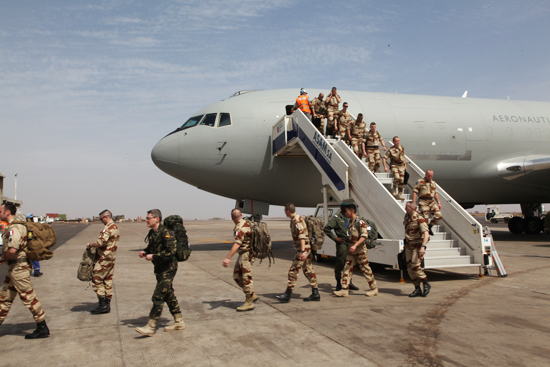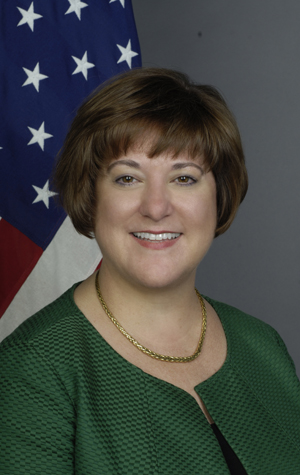Mali Ambassador’s View from the Ground
Alum says mood improving in wake of French intervention

An advance party of European Union Training Mission Mali troops arrives in Bamako, the capital of Mali, where the government is battling rebel factions. Photo courtesy of the European External Action Service
When she was appointed U.S. ambassador to Mali in fall 2011, Mary Beth Leonard referred to the posting as “a delicious gift.” Leonard (CAS’84), who previously served as deputy chief of mission in the North African desert nation, has remained in the capital of Bamako through the recent turmoil of the government’s loss of control to Islamist militants, which led the U.S. State Department in mid-January to order the departure of all Americans and family members not employed by the U.S. Embassy.
In January, France sent air and ground troops to restore order to its former colony, beset in the last decade by divisions among the government and rebel factions, including the northern-based Tuaregs and al-Qaeda in the Islamic Maghreb. Mali Interim President Diancounda Traoré declared a state of emergency on January 12. On February 2 jubilant crowds greeted French President François Hollande on his visit to the battered nation, where he vowed to take main northern towns, including Timbuktu, back from rebels and withdraw French troops when the operation was successful.
BU Today checked in with Leonard about conditions in the capital, Mali’s warring factions, and the outlook for a lasting peace.
BU Today: What is the mood like in the capital?

Leonard: I’m in Bamako, currently sitting in my office with my BU diploma on the wall, actually. The mood in Bamako has changed dramatically for the better in the last two weeks—in reaction to the French military intervention in Mali and subsequent successes against what had been a frightening southward advance by violent extremists. The French have been warmly welcomed: street vendors are selling French and Malian flags, and those in Bamako cannot help but be buoyed by media images of their northern neighbors celebrating the arrival of French and Malian forces into towns that had been oppressed by violent extremist occupation. The offensive brought about a renewed sense of political unity, and on January 29 Mali’s National Assembly passed a long-contentious road map for elections and the resolution of the crisis in the north.
If French forces succeed in defeating the rebels, what is the next step? How will Mali defend itself?
The French intervention is only a first part of the security challenge facing Mali, just as retaking towns is only a first step in countering the corrosive effects of terrorism and violent extremism in northern Mali. Armed forces from several countries in the West African Economic Community (ECOWAS) are currently arriving in Mali, in many cases with logistic and material support from the United States, as part of the African-led International Support Mission in Mali. The United States just announced that it will support this force, pending congressional approval, with a total contribution of $96 million for the fiscal year that will end in September 2013. In addition, the European Union has committed to reforming and retraining the Malian army. Looking at the longer term, Mali’s ability to advance stability, development, and prosperity will rest heavily on a return to a credible, elected government.
Who are the rebels and extremist groups? Can so divided a country find unity?
Taking advantage of a power vacuum left by the March coup d’état, the National Movement for the Liberation of the Azawad (MNLA), a secular ethnic Tuareg nationalist group, and Ansare al Dine (AAD), an extremist group whose leader was linked to an earlier Tuareg rebellion, took control of the three major northern cities of Kidal, Gao, and Timbuktu last April. Material and financial support from al-Qaeda in the Islamic Maghreb (AQIM) supported in particular AAD’s efforts. What began as an indigenous rebellion demanding the creation of Azawad—an independent Tuareg state—was quickly usurped by a broader goal of imposing an oppressive version of Islamic law across Mali.
In thinking about the unity question, it’s important to remember that the separation of north and south was not something the large majority of Malians—northern or southern—wanted. It was militarily imposed, as was the intolerant and brutal form of Islam that accompanied the takeover. Moreover, the international community has been unanimous in its support for Mali’s territorial integrity. The question is therefore less about Malian public sentiment—which strongly favors unity—but relates more to the difficult but important questions about reconciliation with former belligerents, both with other groups in the north and among counterparts in southern Mali.
What is the strategic importance of Mali and the security of people within Mali and in the larger region?
Mali and its famed cities of Timbuktu, Mopti, and Djenne first came to prominence in history as a crossroad of cultures and trade between the African and Arab world dating back to the 14th century. Today, the vast Sahel—in which Mali sits at the center—remains no less important a venue for regional and international security. The international community has long been engaged in efforts to help reinforce the ability of partners in the region to protect their territory against a variety of threats ranging from trafficking to terrorism, an effort that was overwhelmed by the confluence of fighters and weapons flowing from Libya after Qaddafi’s fall, and exacerbated by the coup against the government of Mali. French assistance to Mali against the southward advance by terrorist and rebel fighters has begun to reverse the dangerous early 2013 trend of an expanded safe haven for al-Qaeda–linked terrorists who threatened the stability of neighboring states and even European security. Most diplomatic missions in Mali, including ours, have advised citizens against travel to Mali at this time. While the imminent threat of a southward advance is behind us, the threat of random reprisal attacks from the routed violent extremist groups remains a concern. Most dependents of U.S. mission members have been evacuated, although the Embassy remains open and fully functional. Bamako itself is calm, although we who live here all are mindful of the need for prudence and vigilance in our movements.
What was President Hollande’s visit like?
Saturday, February 2, was an exhilarating day for Mali. French President Hollande and Malian President Diancounda Traoré, who traveled together to Sevare and Timbuktu to thank French and Malian troops, were greeted by cheering crowds. At a rally in Bamako, the French president described his government’s action in the context of a counterpart to African soldiers coming to France’s defense when it was itself invaded in World War II. As the French delegation left Bamako’s Sénou Airport, a U.S. military cargo plane ferrying French troops and supplies was the backdrop to the official French aircraft. Later that evening, Mali defeated South Africa in the quarterfinals of the Africa Nation’s Cup.
You’ve been quoted as saying you are “being an American for a living.” Can you elaborate?
Embassy staff recently told me a funny story about attending a concert in Bamako by an internationally known Malian music star, who needed one of his technical crew to fetch a part to fix his broken guitar in the middle of a set. They collapsed in laughter when he told the young man to go “Quickly! Quickly! Like an American!” Former Secretary of State Hillary Clinton put it this way in one of her last public meetings as secretary of state: “You deal with the challenges you’re given, but you keep your North Star clearly in view. We are privileged to represent and work for the greatest force for good, for progress, for human rights and freedom the world has ever or will ever know.” I’ve had the privilege of being an American for a living in a diplomatic career that in June will reach the 25-year mark, bearing this wonderful responsibility to bring a sense of optimism, energy, and confidence that we can have a positive impact on the environment around us.
Comments & Discussion
Boston University moderates comments to facilitate an informed, substantive, civil conversation. Abusive, profane, self-promotional, misleading, incoherent or off-topic comments will be rejected. Moderators are staffed during regular business hours (EST) and can only accept comments written in English. Statistics or facts must include a citation or a link to the citation.